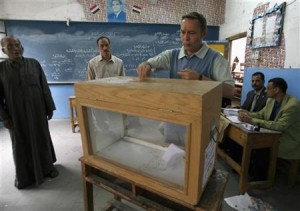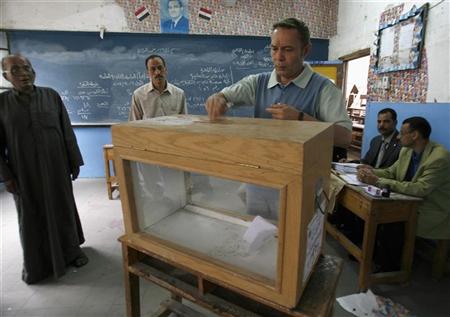 The Organizations signing this statement are disillusioned by the Supreme Council of the Armed forces decision to ban international monitoring of the elections, this decision comes at a time when Egypt is preparing to move forward with peaceful transition to democracy that the Supreme Council vowed to facilitate.
The Organizations signing this statement are disillusioned by the Supreme Council of the Armed forces decision to ban international monitoring of the elections, this decision comes at a time when Egypt is preparing to move forward with peaceful transition to democracy that the Supreme Council vowed to facilitate.
It comes as a surprise that this decision is in direct conflict with Article 3 of Law of political rights no. 46/2011, which stated that it’s the responsibility of the Supreme Commission for Elections to “specify the rules regulatingthe participation of Egyptian and International NGOs in the process of elections monitoring”.
The signing organizations view this decision as a blatant interference in the work of the Supreme Commission for Elections, and show that the Commission is not completely independent and follows regulations of theexecutive authority represented by the Supreme Council of the Armed Forces. Signing organizations view this statement, and other statements by political parties participating in the upcoming elections, raises doubts on theintegrity of the election process. This method was followed by the previous Executive authority and the prime example was the Parliamentary Elections of 2010, which paved the way for mass protest that overthrew Mubarakand his government.
The position of the Supreme Council, and some political parties, show their underestimation of this important issue.
The main goal of any election monitoring operation, either by local Organizations or International ones, is to ensure the integrity of the election process – a goal worthy of reaching whether in an established democracy or a new found/transitional one. The role of International monitoring in that case is an important one, as it reestablishes the faith and importance of voting to the average citizen by ensuring the integrity and importance of the process.
Activities implemented by local and international monitors before the elections and their presence in poll stations encourages and reassures citizens, and the monitoring reports and statements issued by monitors could lead to changes in policies that may lead to fair elections in the future, which cannot be provided by local monitors alone whoever competent they may be – international support is always needed to develop their capacities and gaining new experience and skills.
Signing organizations also point out the intentional misinterpretation of international monitoring and labeling it as a violation of national sovereignty. Monitoring differs completely from the international supervision of theelections which is implemented at the request of the host country and offers complete cooperation.
The signing organizations also point out that in the last five years many Egyptian organizations monitoredelections in different countries, for example (Iraq, Lebanon, Morocco, Bahrain, Sudan, Algeria, Mauritania, United States of America and Britain). Some of these countries are sovereign nations and some are even old established democracies. Countries often invite international monitors to ensure its neutrality and the integrity ofthe election process.
Signing organizations demand from the Supreme Council of the Armed Forces to stop interfering in the work ofthe Supreme Committee for Elections and maintain neutrality throughout the current political process, signing organizations also demand the Supreme Committee for Elections to promptly delicate the rules and regulations allowing Non-governmental organizations, local and international, to monitor the electoral process and to ensure that it will work on facilitating the process of international monitoring for Egyptian elections which the integrity of it is vital not only to political parties, but also to all Egyptians considering the upcoming parliament is going to choose the Constitutional committee that will write Egypt’s new constitution.
Signing Organizations
- Cairo Institute for Human Rights Studies
- One World Foundation for Development and Civil Society Care
- Egyptian Association for Community Participation Enhancement
- Arab Penal Reform Organization
- United Group
- Andalus Institute for Tolerance and Anti-violence Studies
Share this Post

